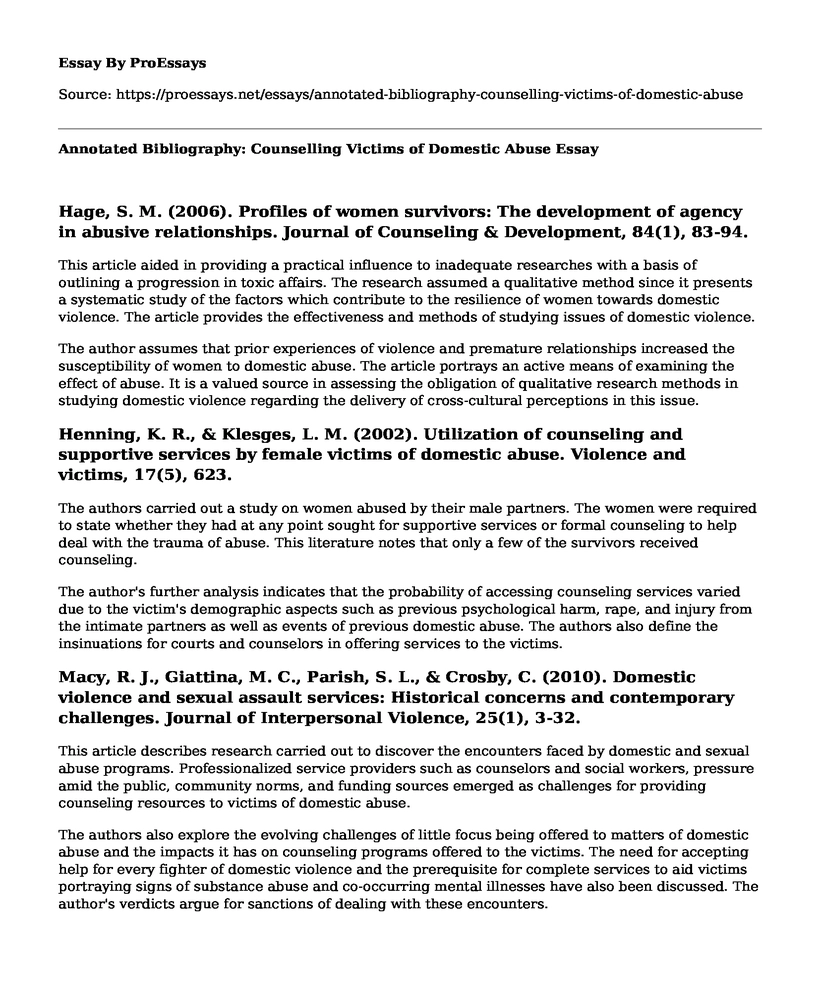Hage, S. M. (2006). Profiles of women survivors: The development of agency in abusive relationships. Journal of Counseling & Development, 84(1), 83-94.
This article aided in providing a practical influence to inadequate researches with a basis of outlining a progression in toxic affairs. The research assumed a qualitative method since it presents a systematic study of the factors which contribute to the resilience of women towards domestic violence. The article provides the effectiveness and methods of studying issues of domestic violence.
The author assumes that prior experiences of violence and premature relationships increased the susceptibility of women to domestic abuse. The article portrays an active means of examining the effect of abuse. It is a valued source in assessing the obligation of qualitative research methods in studying domestic violence regarding the delivery of cross-cultural perceptions in this issue.
Henning, K. R., & Klesges, L. M. (2002). Utilization of counseling and supportive services by female victims of domestic abuse. Violence and victims, 17(5), 623.
The authors carried out a study on women abused by their male partners. The women were required to state whether they had at any point sought for supportive services or formal counseling to help deal with the trauma of abuse. This literature notes that only a few of the survivors received counseling.
The author's further analysis indicates that the probability of accessing counseling services varied due to the victim's demographic aspects such as previous psychological harm, rape, and injury from the intimate partners as well as events of previous domestic abuse. The authors also define the insinuations for courts and counselors in offering services to the victims.
Macy, R. J., Giattina, M. C., Parish, S. L., & Crosby, C. (2010). Domestic violence and sexual assault services: Historical concerns and contemporary challenges. Journal of Interpersonal Violence, 25(1), 3-32.
This article describes research carried out to discover the encounters faced by domestic and sexual abuse programs. Professionalized service providers such as counselors and social workers, pressure amid the public, community norms, and funding sources emerged as challenges for providing counseling resources to victims of domestic abuse.
The authors also explore the evolving challenges of little focus being offered to matters of domestic abuse and the impacts it has on counseling programs offered to the victims. The need for accepting help for every fighter of domestic violence and the prerequisite for complete services to aid victims portraying signs of substance abuse and co-occurring mental illnesses have also been discussed. The author's verdicts argue for sanctions of dealing with these encounters.
Macy, R. J., Johns, N., Rizo, C. F., Martin, S. L., & Giattina, M. (2011). Domestic violence and sexual assault service goal priorities. Journal of interpersonal violence, 26(16), 3361-3382.
The authors study opinions of agency directors for domestic abuse on how program delivery is prioritized for different services include support groups, medical and legal advocacy, individual and post-trauma counseling. According to the article, counselors tend to prioritize the development of interactions among the survivors.
Self-care programs and social support methods were perceived to be of less importance in counseling. Emotional support, on the other hand, has been viewed as a crucial technique that can be used to counsel the victims. The authors found out that prioritization of programs objectives was different contingent to the kind of service. The findings and the study suggested that individual counseling is preferred to group therapy in certain situations.
Zweig, J. M., & Burt, M. R. (2007). Predicting women's perceptions of domestic violence and sexual assault agency helpfulness: What matters to program clients?. Violence Against Women, 13(11), 1149-1178.
This study evaluates whether a blend of counseling programs offered, character traits of other employees, and community agency partnership forecasts women's insight of counseling within sexual and domestic abuse programs. Women discovered that programs which did not focus on financial gain were more effective and the usefulness of this services was improved when methods of intervention incorporated other community activities and the legal system.
The authors have discussed the verdicts on envisaging the usefulness of domestic abuse agencies around individual advocacy and legal advocacy, emotional support, child advocacy, and issues of safety. The authors also define future suggestions for preparation such as employees conduct while associating with survivors and improving the victim's sense of control when dealing with counseling programs.
References
Hage, S. M. (2006). Profiles of women survivors: The development of agency in abusive relationships. Journal of Counseling & Development, 84(1), 83-94.
Henning, K. R., & Klesges, L. M. (2002). Utilization of counseling and supportive services by female victims of domestic abuse. Violence and victims, 17(5), 623.
Macy, R. J., Giattina, M. C., Parish, S. L., & Crosby, C. (2010). Domestic violence and sexual assault services: Historical concerns and contemporary challenges. Journal of Interpersonal Violence, 25(1), 3-32.
Macy, R. J., Johns, N., Rizo, C. F., Martin, S. L., & Giattina, M. (2011). Domestic violence and sexual assault service goal priorities. Journal of interpersonal violence, 26(16), 3361-3382.
Zweig, J. M., & Burt, M. R. (2007). Predicting women's perceptions of domestic violence and sexual assault agency helpfulness: What matters to program clients?. Violence Against Women, 13(11), 1149-1178.
Cite this page
Annotated Bibliography: Counselling Victims of Domestic Abuse. (2022, May 26). Retrieved from https://proessays.net/essays/annotated-bibliography-counselling-victims-of-domestic-abuse
If you are the original author of this essay and no longer wish to have it published on the ProEssays website, please click below to request its removal:
- Reasons for RAOK Essay
- Legislation Protecting Minority Groups and Women Essay
- Essay Sample on Segregation and Activism
- Methamphetamine: An Illegal Drug Used For Recreational & Medical Purposes - Research Paper
- 9/11: Mourning, Outrage & Giuliani's UN Address - Essay Sample
- Conquering Smoking Addiction: Steps for Mitigation & Better Decision Making - Essay Sample
- Challenges and Initiatives: Addressing Systemic Racism in Canadian Sports - Free Paper Example







